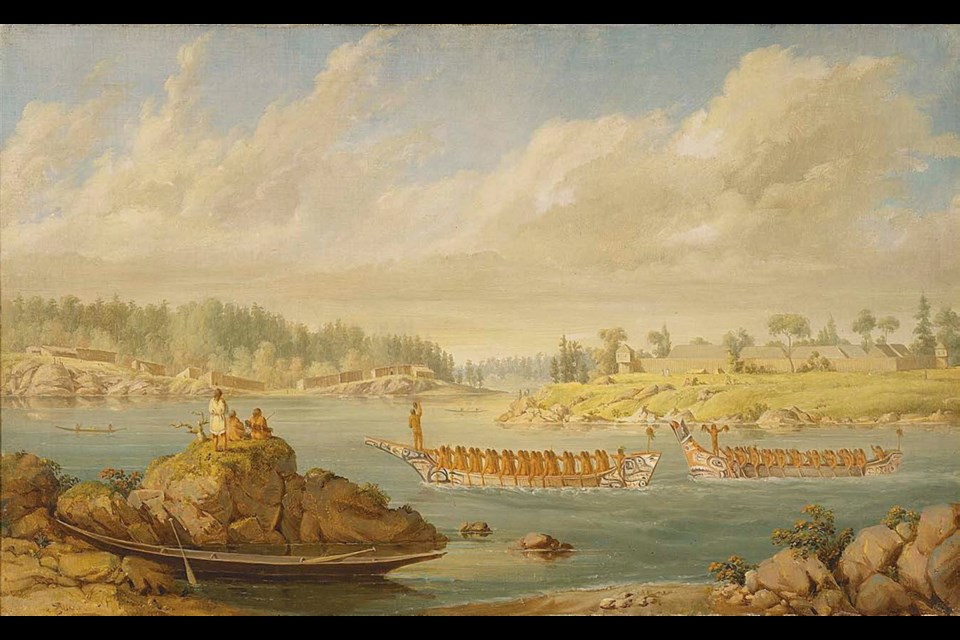There are two main mysteries about the 14 treaties made on Vancouver Island between 1850 and 1854: What was the First Nations’ understanding of the agreements, and why were there no treaties after 1854?
The first mystery, the First Nations’ understanding of the agreements, will be the focus of discussions next weekend at a conference at the Songhees Wellness Centre, but recently uncovered evidence in the B.C. Archives has helped solve the second of the mysteries.
It has long puzzled historians why Sir James Douglas seemed to recognize aboriginal title and made treaties to purchase title to the area between Saanich and Sooke, and around Nanaimo and Fort Rupert (near Port Hardy) only to stop after four years, leaving most of Vancouver Island and British Columbia with no treaties and no explanation why.
The historical consensus has been that some time between the 1854 Nanaimo treaty and 1858, when the gold rush hit this region like a tsunami, Douglas changed his mind.
Some argue that he realized the treaties had not benefited indigenous people, others argue that, with the gold rush, events moved too fast and to negotiate treaties across B.C. would have been too complicated, and still others argue that with disease and depopulation he thought indigenous people were going to vanish in any case.
There is, however, one problem with all these explanations: James Douglas did not change his mind. Douglas remained a supporter of treaties through to his retirement in 1864.
One of the few principles Douglas clearly stated was that treaties were only to be signed when an area was needed for settlement. Because there was a fort at Victoria, a settler in Sooke and interest in Saanich farmlands, he signed 11 treaties between 1850 and 1852 covering the coast from Sidney to Sooke.
Because coal had been discovered and a fort established near today’s Port Hardy, two treaties were signed with the local people there, and when coal was discovered in Nanaimo, the final treaty was made there in 1854.
When the Cowichan First Nations asked for a treaty in 1850, Douglas declined because there was no immediate prospect of European settlers there. Between 1854 and 1858, the few newcomers settled in areas already covered by treaties, so there was no need for new ones.
Then, in 1858, gold was found on the mainland, and the settler population of Vancouver Island exploded with the market to grow food for the miners.
Douglas opened up the Salt Spring Island, Cowichan and Chemainus areas for settlement in 1859, and when he did, newly discovered evidence shows he was promising the settlers he would purchase the title from the local indigenous people.
From 1858 to 1864, the Land Office records show that Douglas and his officials were continually promising both the settlers and the indigenous people that treaties would soon be signed. Increasingly, indigenous people in these areas complained that they had not received a treaty and settlers petitioned for treaties because angry indigenous people were harassing them.
Douglas wanted to sign treaties, First Nations apparently wanted treaties and settlers wanted treaties, so why no treaties? The short answer: two bureaucratic snafus.
From 1849 to 1859, Douglas was the land agent for the Hudson’s Bay Company, which had been given the authority to sell land and settle title on Vancouver Island. But in 1859, the British government exercised its right under the original agreement with the HBC to resume control of Vancouver Island, as long as it paid the HBC for expenses incurred for running the colony over the decade. But there was a problem.
The HBC and the British government could not agree on what the company was owed. So the HBC refused to transfer title back to the Crown until the debts were paid, a dispute that raged over the next eight years, during which neither side had a clear claim to the Island nor had the full authority to extinguish aboriginal title.
Further, Douglas and the elected Vancouver Island Legislative Assembly were locked in a battle over which of them controlled the revenue from land sales, which made it impossible for either to spend money on treaties.
Despite the intentions of James Douglas, the will of the assembly, and the support of both settlers and indigenous people, these two unrelated bureaucratic disputes prevented Douglas from making more treaties through to his retirement in 1864.
The new governors who replaced him took a different approach and as a result, treaty-making ended in 1854 and did not resume on Vancouver Island until the Maa-nulth Treaty covering parts of the west coast came into effect in 2011.
Historians John Lutz and Graham Brazier will unpack the full story of the end of treaty-making in a session at the conference First Nations, Land, and James Douglas: Indigenous and Treaty Rights in the Colonies of Vancouver Island and British Columbia, 1849-1864, from Feb. 24-26 at the Songhees Wellness Centre.



